冀教版七年级英语下1--8单元知识点总结
- 格式:doc
- 大小:62.00 KB
- 文档页数:6
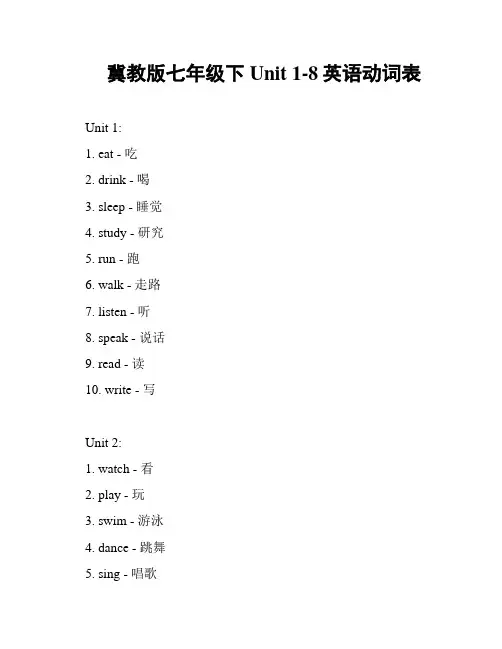
冀教版七年级下Unit 1-8英语动词表Unit 1:1. eat - 吃2. drink - 喝3. sleep - 睡觉4. study - 研究5. run - 跑6. walk - 走路7. listen - 听8. speak - 说话9. read - 读10. write - 写Unit 2:1. watch - 看2. play - 玩3. swim - 游泳4. dance - 跳舞5. sing - 唱歌6. draw - 画7. cook - 烹饪8. clean - 清洁9. listen - 听10. speak - 说话Unit 3:1. buy - 购买2. sell - 卖3. do - 做4. go - 去6. visit - 参观7. ride - 骑8. fly - 飞行9. help - 帮助10. invite - 邀请Unit 4:1. like - 喜欢2. love - 爱3. dislike - 不喜欢4. enjoy - 享受5. prefer - 更喜欢6. understand - 理解7. remember - 记得8. forget - 忘记9. know - 知道10. believe - 相信Unit 5:1. play - 玩3. win - 赢4. lose - 输5. read - 阅读6. answer - 回答7. ask - 询问8. teach - 教9. learn - 研究10. practice - 练Unit 6:1. plant - 种植2. grow - 生长3. water - 浇水4. harvest - 收获5. cook - 烹饪6. taste - 品尝7. smell - 闻8. touch - 触摸9. see - 见10. hear - 听到Unit 7:1. buy - 买2. sell - 卖3. need - 需要4. want - 想要5. have - 有6. bring - 带来7. take - 拿取8. give - 给予9. send - 发送10. receive - 收到Unit 8:1. write - 写2. send - 发送3. receive - 收到4. check - 检查5. reply - 回复6. sign - 签名7. print - 打印8. scan - 扫描9. save - 保存10. delete - 删除。
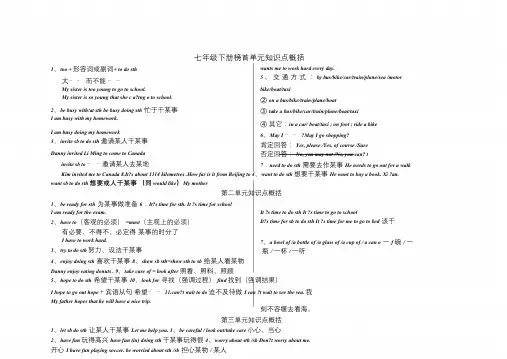
七年级下册榜首单元知识点概括1、too + 形容词或副词+ to do sth太⋯⋯而不能⋯⋯wants me to work hard every day.5 、交通方式:by bus/bike/car/train/plane/sea /motorMy sister is too young to go to school.My sister is so young that she c a?tng o to school. b ike/boat/taxi②on a bus/bike/train/plane/boat2、be busy with/at sth be busy doing sth忙于干某事I am busy with my homework. ③take a bus/bike/car/train/plane/boat/taxi④其它:in a car/ boat/taxi ; on foot ; ride a bikeI am busy doing my homework3、invite sb to do sth 邀请某人干某事6、May I ⋯⋯?May I go shopping?肯定回答:Yes, please /Yes, of course /SureDanny invited Li Ming to come to Canada invite sb to ⋯⋯邀请某人去某地否定回答:No, you may not /No, you can? t7.need to do sth需要去作某事He needs to go out for a walkKim invited me to Canada 8.It?s about 1114 kilometres .How far is it from Beijing to 4、want to do sth 想要干某事He want to buy a book. Xi ?an. want sb to do sth 想要或人干某事(同 would like)My mother第二单元知识点概括1、be ready for sth为某事做准备6.It?s time for sth. It ?s time for schoolI am ready for the exam.2、have to(客观的必须)=must(主观上的必须)It ?s time to do sth It ?s time to go to schoolIt?s time for sb to do sth It ?s time for me to go to bed该干有必要、不得不、必定得某事的时分了I have to work hard.3、try to do sth 努力、设法干某事7、a bowl of /a bottle of /a glass of /a cup of / a can o一f 碗/ 一瓶/ 一杯/ 一听4、enjoy doing sth喜欢干某事8、show sb sth=show sth to sb给某人看某物Danny enjoy eating donuts . 9、take care of = look after 照看、照料、照顾5、hope to do sth希望干某事10、look for寻找(强调过程)find 找到(强调结果)I hope to go out hope+宾语从句希望⋯⋯11.can?t wait to do 迫不及待做I can ?t wait to see the sea. 我My father hopes that he will have a nice trip.刻不容缓去看海。
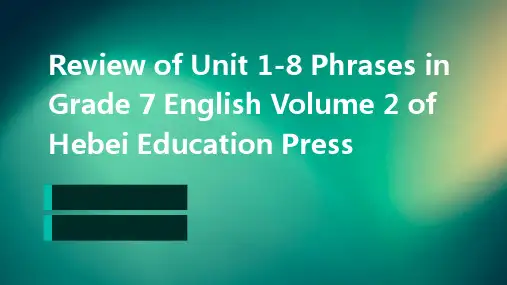
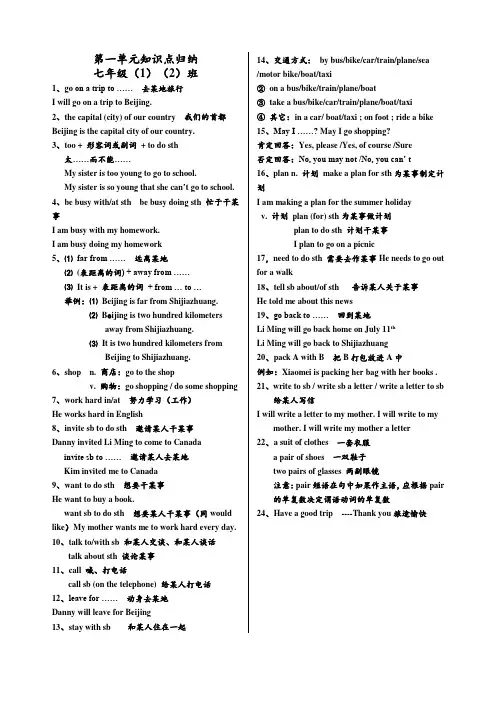
第一单元知识点归纳七年级(1)(2)班1、go on a trip to …… 去某地旅行I will go on a trip to Beijing.2、the capital (city) of our country 我们的首都Beijing is the capital city of our country.3、too + 形容词或副词+ to do sth太……而不能……My sister is too young to go to school.My sister is so young that she can’t go to school.4、be busy with/at sth be busy doing sth 忙于干某事I am busy with my homework.I am busy doing my homework5、⑴far from …… 远离某地⑵(表距离的词) + away from ……⑶It is + 表距离的词+ from … to …举例:⑴Beijing is far from Shijiazhuang.⑵B e ijing is two hundred kilometersaway from Shijiazhuang.⑶It is two hundred kilometers fromBeijing to Shijiazhuang.6、shop n. 商店:go to the shopv. 购物:go shopping / do some shopping 7、work hard in/at 努力学习(工作)He works hard in English8、invite sb to do sth 邀请某人干某事Danny invited Li Ming to come to Canadainvite sb to …… 邀请某人去某地Kim invited me to Canada9、want to do sth 想要干某事He want to buy a book.want sb to do sth 想要某人干某事(同would like)My mother wants me to work hard every day.10、talk to/with sb 和某人交谈、和某人谈话talk about sth 谈论某事11、call 喊、打电话call sb (on the telephone) 给某人打电话12、leave for …… 动身去某地Danny will leave for Beijing13、stay with sb 和某人住在一起14、交通方式:by bus/bike/car/train/plane/sea/motor bike/boat/taxi②on a bus/bike/train/plane/boat③take a bus/bike/car/train/plane/boat/taxi④其它:in a car/ boat/taxi ; on foot ; ride a bike15、May I ……? May I go shopping?肯定回答:Yes, please /Yes, of course /Sure否定回答:No, you may not /No, you can’ t16、plan n. 计划make a plan for sth为某事制定计划I am making a plan for the summer holidayv. 计划plan (for) sth为某事做计划plan to do sth 计划干某事I plan to go on a picnic17,need to do sth 需要去作某事He needs to go out for a walk18、tell sb about/of sth 告诉某人关于某事He told me about this news19、go back to …… 回到某地Li Ming will go back home on July 11thLi Ming will go back to Shijiazhuang20、pack A with B 把B打包放进A中例如:Xiaomei is packing her bag with her books .21、write to sb / write sb a letter / write a letter to sb给某人写信I will write a letter to my mother. I will write to mymother. I will write my mother a letter22、a suit of clothes 一套衣服a pair of shoes 一双鞋子two pairs of glasses 两副眼镜注意:pair短语在句中如果作主语,应根据pair 的单复数决定谓语动词的单复数24、Have a good trip ----Thank you旅途愉快第二单元知识点归纳1、argue with sb about sth 因某事和某人争论2、get on 上车get off 下车3、be ready for sth 为某事做准备I am ready for the exam.4、a ticket to Canada去加拿大的票5、in +某种语言——用某种语言What’s this in English?speak+某种语言——说某种语言He speaks English.6、pardon me 对不起、请重复一遍=Excuse me7、have to(客观的必须)=must(主观上的必须)必须、不得不、一定得I have to work hard.8、look out of 从……向外看look out of the window9、here and there 到处、四处10、point to 指向point at 指着point out指出11、at the top of 在……的顶端at the bottom of在……的底部12、try to do sth 努力、设法干某事13、be from spl = come from spl 来自某地16、places of interest /the interesting place 名胜古迹17、enjoy doing sth 喜欢干某事Danny enjoy eating donuts .18、hope to do sth 希望干某事I hope to go out hope+宾语从句希望……My father hopes that he will have a nice trip.19、It’s time for sth. It’s time for schoolIt’s time to do sth It’s time to go to schoolIt’s time for sb to do sthIt’s time for me to go to bed该干某事的时候了20、wait for sb/sth 等待某人、某物21、find out 查出、查明find sb doing sth 发现某人正在干某事22、feel+形容词/ be +形容词:感觉怎么样How do you feel? I feel happy.23、a bowl of /a bottle of /a glass of /a cup of / acan of 一碗/ 一瓶/ 一杯/ 一听24、be quiet 安静keep quiet 保持安静25、play with sb 和某人一起玩play with sth 玩弄某物如:Don’t play with fire ! 不要玩火!play +球类名词(不要the)play+the +乐器名词(必须要the)26、watch TV / a football match / a moviesee a flimread the book / the newspaper27、show sb sth=show sth to sb 给某人看某物28、take care of = look after 照看、照料、照顾29、look for 寻找(强调过程)find 找到(强调结果)第三单元知识点归纳1、let sb do sth 让某人干某事Let me help you.2、I speak good English = I speak English well我英语讲得好.3、translate for sb 为某人翻译4、laugh at sb 嘲笑某人Don’t laugh at others.fly a kite / fly kites 放风筝5、have fun 玩得高兴have fun (in) doing sth 干某事玩得很开心I have fun playing soccer.6、make fun 开玩笑7、hurt one’s +身体部位:hurt my nose / hurt my arm . 8、Don’t be afraid . 不要害怕Don’t worry . 不要担心9、be careful / look out/take care 小心、当心10、worry about sth /sb Don’t worry about me.sb be worried about sth /sbMy mother is worried about my study.担心某物/ 某人11、put … on … 把……放在……上put … in … 把……放进……里12、take one’s picture 给某人照相take a picture /take pictures/photos照相13、用…… with + 具体工具如:She write a letter to her friends with pen .by 通过某种方式如:She sends messages to her friends by postcard 14、fall off 从……上掉下来He fell off his surfboard15、help sb do sth help sb with sth帮助某人干某事Jenny helps me learn English. Jenny helps me with English16、at the post office 在邮局17、break his tail 折断了他的尾巴Danny broke his tail yesterday18、at the traffic lights 在交通灯的地方19、There be + sb +动词ing 形式+地点(介词短语)某处有某人正在干某事There is a girl dancing in the room.20、on the left 在左边on the right 在右边21、on the postcard 在明信片上23、go straight down …… 沿着……直走24、in an hour 一个小时以后I will come back in an hour25、write sb a letter / write a letter to sb / write to sb给某人写信26、a pair of chopsticks 一双筷子27、send sb sth /send sth to sb给某人寄(送)某物He sent me a postcard. He sent a postcard to me28、buy sb sth / buy sth for sb 给某人买某物I buy my mother a gift.= I buy a gift for my mother.29、be late for sth 干某事迟到He is late for work.30、turn left向左转turn right向右转31、begin/start to do sth begin/start doing sth开始干某事32、a gift for sb 给某人的礼物33、a kind of 一种all kinds of 各种各样的34、A man who has not climbed the Great Wall isa true man . 不到长城非好汉35、see sb doing sth 看见某人正在干某事(动作正在进行)I saw many people flying kites on the squaresee sb do sth看见某人干了某事(动作发生的过程)36、许多many +可数名词many books much+不可数名词much meata lot of/ lots of + 可数或不可数名词37、一些 a little +不可数名词 a few +可数名词some/any + 可数或不可数名词(注意:some 用于肯定句any用于否定句和疑问句)38、put on 穿上、戴上(穿的动作)wear 穿着、戴着(穿的状态)39、turn on 打开turn up 调大turn off 关闭turn down 调小40、停止干某事stop to do sth 停下来去做另外一件事I stop to have a reststop doing sth 停止正在干的事I stop talking41、在……的前面in front of 在(室外)没有局限空间的地方的前面There is a tree in front of the classroomin the front of 在(室内)有限空间的地方的前面There is a TV in the front of the classroom.第四单元知识点归纳1、Thank sb for sth 为某事谢谢某人Thank you for your invitationThank sb for doing sth 谢谢某人干某事Thank you for inviting me to your party 2、at the airport 在飞机场3、It is for you 它是给你的4、the first /second day 第一/二天5、This is sb at /in spl 这是某人在某地6、This sth is for sb 这是给某人的某物This book is for you7、receive/get……from…… 收到来自……的……8、ask for 请求9、ask sb for sth 向某人要(请求)某物.Ask sb to do sth要求某人干某事。
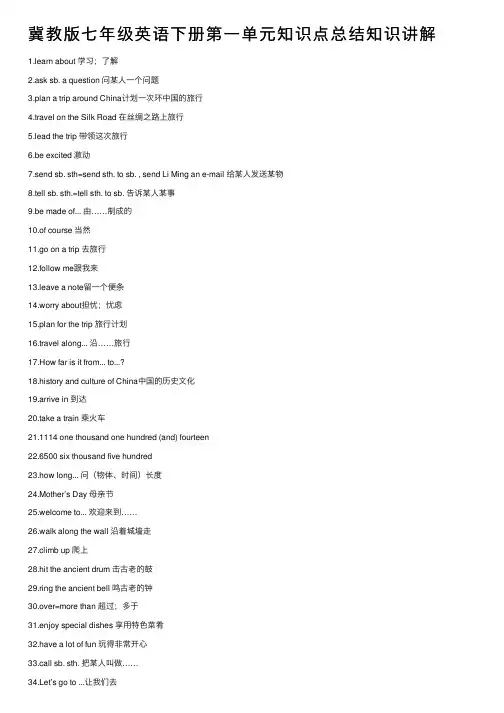
冀教版七年级英语下册第⼀单元知识点总结知识讲解1.learn about 学习;了解2.ask sb. a question 问某⼈⼀个问题3.plan a trip around China计划⼀次环中国的旅⾏4.travel on the Silk Road 在丝绸之路上旅⾏5.lead the trip 带领这次旅⾏6.be excited 激动7.send sb. sth=send sth. to sb. , send Li Ming an e-mail 给某⼈发送某物8.tell sb. sth.=tell sth. to sb. 告诉某⼈某事9.be made of... 由……制成的10.of course 当然11.go on a trip 去旅⾏12.follow me跟我来13.leave a note留⼀个便条14.worry about担忧;忧虑15.plan for the trip 旅⾏计划16.travel along... 沿……旅⾏17.How far is it from... to...?18.history and culture of China中国的历史⽂化19.arrive in 到达20.take a train 乘⽕车21.1114 one thousand one hundred (and) fourteen22.6500 six thousand five hundred23.how long... 问(物体、时间)长度24.Mother’s Day 母亲节25.welcome to... 欢迎来到……26.walk along the wall 沿着城墙⾛27.climb up 爬上28.hit the ancient drum 击古⽼的⿎29.ring the ancient bell 鸣古⽼的钟30.over=more than 超过;多于31.enjoy special dishes 享⽤特⾊菜肴32.have a lot of fun 玩得⾮常开⼼33.call sb. sth. 把某⼈叫做……34.Let’s go to ...让我们去35.one of... 其中之⼀36.take photos/ pictures 拍照37.No photos!禁⽌拍照38.places of interest 名胜39.go to the hotel 去宾馆40.go for a walk 去散步41.all right 好的,可以,⾏42.Let’s go down this street and turn left at the traffic lights.让我们沿着这条街⾛然后在交通灯处向左拐。
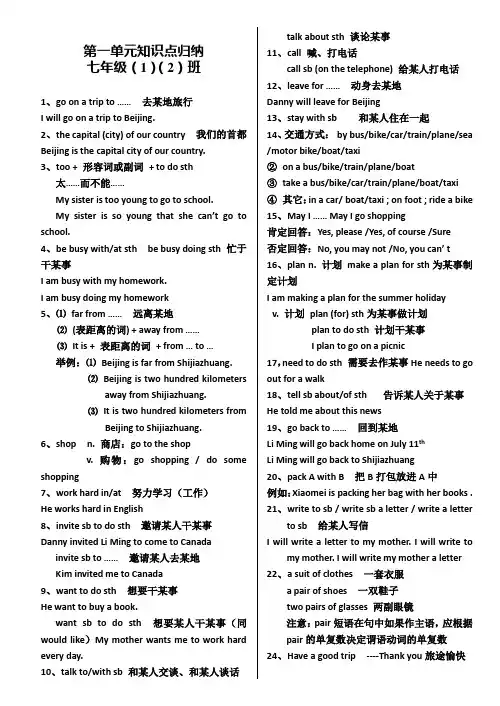
第一单元知识点归纳七年级(1)(2)班1、go on a trip to …… 去某地旅行I will go on a trip to Beijing.2、the capital (city) of our country 我们的首都Beijing is the capital city of our country.3、too + 形容词或副词+ to do sth太……而不能……My sister is too young to go to school.My sister is so young that she can’t go to school.4、be busy with/at sth be busy doing sth 忙于干某事I am busy with my homework.I am busy doing my homework5、⑴far from …… 远离某地⑵(表距离的词) + away from ……⑶It is + 表距离的词+ from … to …举例:⑴Beijing is far from Shijiazhuang.⑵Beijing is two hundred kilometersaway from Shijiazhuang.⑶It is two hundred kilometers fromBeijing to Shijiazhuang.6、shop n. 商店:go to the shopv. 购物:go shopping / do some shopping7、work hard in/at 努力学习(工作)He works hard in English8、invite sb to do sth 邀请某人干某事Danny invited Li Ming to come to Canada invite sb to …… 邀请某人去某地Kim invited me to Canada9、want to do sth 想要干某事He want to buy a book.want sb to do sth 想要某人干某事(同would like)My mother wants me to work hard every day.10、talk to/with sb 和某人交谈、和某人谈话talk about sth 谈论某事11、call 喊、打电话call sb (on the telephone) 给某人打电话12、leave for …… 动身去某地Danny will leave for Beijing13、stay with sb 和某人住在一起14、交通方式:by bus/bike/car/train/plane/sea /motor bike/boat/taxi②on a bus/bike/train/plane/boat③take a bus/bike/car/train/plane/boat/taxi④其它:in a car/ boat/taxi ; on foot ; ride a bike15、May I …… May I go shopping肯定回答:Yes, please /Yes, of course /Sure否定回答:No, you may not /No, you can’ t 16、plan n. 计划make a plan for sth为某事制定计划I am making a plan for the summer holidayv. 计划plan (for) sth为某事做计划plan to do sth 计划干某事I plan to go on a picnic17,need to do sth 需要去作某事He needs to go out for a walk18、tell sb about/of sth 告诉某人关于某事He told me about this news19、go back to …… 回到某地Li Ming will go back home on July 11thLi Ming will go back to Shijiazhuang20、pack A with B 把B打包放进A中例如:Xiaomei is packing her bag with her books .21、write to sb / write sb a letter / write a letterto sb 给某人写信I will write a letter to my mother. I will write tomy mother. I will write my mother a letter22、a suit of clothes 一套衣服a pair of shoes 一双鞋子two pairs of glasses 两副眼镜注意:pair短语在句中如果作主语,应根据pair的单复数决定谓语动词的单复数24、Have a good trip ----Thank you旅途愉快第二单元知识点归纳1、argue with sb about sth 因某事和某人争论2、get on 上车get off 下车3、be ready for sth 为某事做准备I am ready for the exam.4、a ticket to Canada去加拿大的票5、in +某种语言——用某种语言What’s this in Englishspeak+某种语言——说某种语言He speaks English.6、pardon me 对不起、请重复一遍=Excuse me7、have to(客观的必须)=must(主观上的必须)必须、不得不、一定得I have to work hard.8、look out of 从……向外看look out of the window9、here and there 到处、四处10、point to 指向point at 指着point out 指出11、at the top of 在……的顶端at the bottom of在……的底部12、try to do sth 努力、设法干某事13、be from spl = come from spl 来自某地16、places of interest /the interesting place 名胜古迹17、enjoy doing sth 喜欢干某事Danny enjoy eating donuts .18、hope to do sth 希望干某事I hope to go out hope+宾语从句希望……My father hopes that he will have a nice trip.19、It’s time for sth. It’s time for schoolIt’s time to do sth It’s time to go to schoolIt’s time for sb to do sthIt’s time for me to go to bed该干某事的时候了20、wait for sb/sth 等待某人、某物21、find out 查出、查明find sb doing sth 发现某人正在干某事22、feel+形容词/ be +形容词:感觉怎么样How do you feel I feel happy.23、a bowl of /a bottle of /a glass of /a cup of / acan of 一碗/ 一瓶/ 一杯/ 一听24、be quiet 安静keep quiet 保持安静25、play with sb 和某人一起玩play with sth 玩弄某物如:Don’t play with fire ! 不要玩火!play +球类名词(不要the)play+the +乐器名词(必须要the)26、watch TV / a football match / a moviesee a flimread the book / the newspaper27、show sb sth=show sth to sb 给某人看某物28、take care of = look after 照看、照料、照顾29、look for 寻找(强调过程)find 找到(强调结果)第三单元知识点归纳1、let sb do sth 让某人干某事Let me help you.2、I speak good English = I speak English well我英语讲得好.3、translate for sb 为某人翻译4、laugh at sb 嘲笑某人Don’t laugh at others.fly a kite / fly kites 放风筝5、have fun 玩得高兴have fun (in) doing sth 干某事玩得很开心I have fun playing soccer.6、make fun 开玩笑7、hurt one’s +身体部位:hurt my nose / hurt my arm .8、Don’t be afraid . 不要害怕Don’t worry . 不要担心9、be careful / look out/take care 小心、当心10、worry about sth /sb Don’t worry about me.sb be worried about sth /sbMy mother is worried about my study.担心某物/ 某人11、put … on … 把……放在……上put … in … 把……放进……里12、take one’s picture 给某人照相take a picture /take pictures/photos照相13、用…… with + 具体工具如:She write a letter to her friends with pen .by 通过某种方式如:She sends messages to her friends by postcard14、fall off 从……上掉下来He fell off his surfboard15、help sb do sth help sb with sth帮助某人干某事Jenny helps me learn English. Jenny helps me with English16、at the post office 在邮局17、break his tail 折断了他的尾巴Danny broke his tail yesterday18、at the traffic lights 在交通灯的地方19、There be + sb +动词ing 形式+地点(介词短语)某处有某人正在干某事There is a girl dancing in the room.20、on the left 在左边on the right 在右边21、on the postcard 在明信片上23、go straight down …… 沿着……直走24、in an hour 一个小时以后I will come back in an hour25、write sb a letter / write a letter to sb / write to sb给某人写信26、a pair of chopsticks 一双筷子27、send sb sth /send sth to sb给某人寄(送)某物He sent me a postcard. He sent a postcard to me28、buy sb sth / buy sth for sb 给某人买某物I buy my mother a gift.= I buy a gift for my mother.29、be late for sth 干某事迟到He is late for work.30、turn left向左转turn right向右转31、begin/start to do sth begin/start doing sth开始干某事32、a gift for sb 给某人的礼物33、a kind of 一种all kinds of 各种各样的34、A man who has not climbed the Great Wall isa true man . 不到长城非好汉35、see sb doing sth 看见某人正在干某事(动作正在进行)I saw many people flying kites on the squaresee sb do sth看见某人干了某事(动作发生的过程)36、许多many +可数名词many books much+不可数名词much meata lot of/ lots of + 可数或不可数名词37、一些 a little +不可数名词 a few +可数名词some/any + 可数或不可数名词(注意:some 用于肯定句any用于否定句和疑问句)38、put on 穿上、戴上(穿的动作)wear 穿着、戴着(穿的状态)39、turn on 打开turn up 调大turn off 关闭turn down 调小40、停止干某事stop to do sth 停下来去做另外一件事I stop to have a reststop doing sth 停止正在干的事I stop talking41、在……的前面in front of 在(室外)没有局限空间的地方的前面There is a tree in front of the classroomin the front of 在(室内)有限空间的地方的前面There is a TV in the front of the classroom.第四单元知识点归纳1、Thank sb for sth 为某事谢谢某人Thank you for your invitationThank sb for doing sth 谢谢某人干某事Thank you for inviting me to your party2、at the airport 在飞机场3、It is for you 它是给你的4、the first /second day 第一/二天5、This is sb at /in spl 这是某人在某地6、This sth is for sb 这是给某人的某物This book is for you7、receive/get……from…… 收到来自……的……8、ask for 请求9、ask sb for sth 向某人要(请求)某物.Ask sb to do sth要求某人干某事。
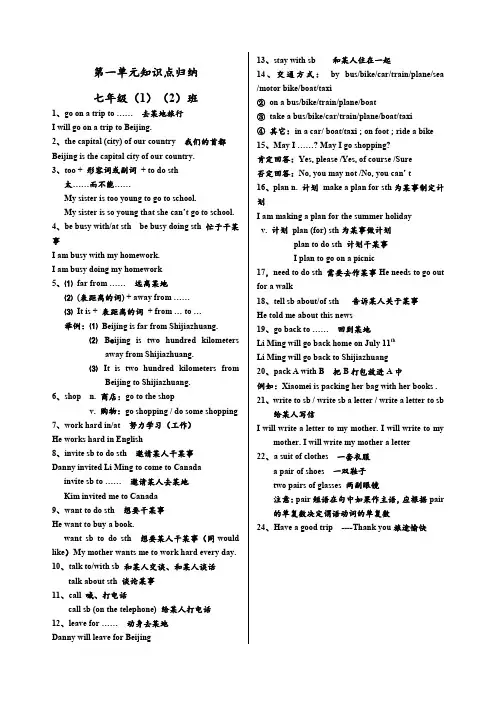
第一单元知识点归纳七年级(1)(2)班1、go on a trip to …… 去某地旅行I will go on a trip to Beijing.2、the capital (city) of our country 我们的首都Beijing is the capital city of our country.3、too + 形容词或副词+ to do sth太……而不能……My sister is too young to go to school.My sister is so young that she can’t go to school.4、be busy with/at sth be busy doing sth 忙于干某事I am busy with my homework.I am busy doing my homework5、⑴far from …… 远离某地⑵(表距离的词) + away from ……⑶It is + 表距离的词+ from … to …举例:⑴Beijing is far from Shijiazhuang.⑵B e ijing is two hundred kilometersaway from Shijiazhuang.⑶It is two hundred kilometers fromBeijing to Shijiazhuang.6、shop n. 商店:go to the shopv. 购物:go shopping / do some shopping 7、work hard in/at 努力学习(工作)He works hard in English8、invite sb to do sth 邀请某人干某事Danny invited Li Ming to come to Canadainvite sb to …… 邀请某人去某地Kim invited me to Canada9、want to do sth 想要干某事He want to buy a book.want sb to do sth 想要某人干某事(同would like)My mother wants me to work hard every day.10、talk to/with sb 和某人交谈、和某人谈话talk about sth 谈论某事11、call 喊、打电话call sb (on the telephone) 给某人打电话12、leave for …… 动身去某地Danny will leave for Beijing 13、stay with sb 和某人住在一起14、交通方式:by bus/bike/car/train/plane/sea /motor bike/boat/taxi②on a bus/bike/train/plane/boat③take a bus/bike/car/train/plane/boat/taxi④其它:in a car/ boat/taxi ; on foot ; ride a bike15、May I ……? May I go shopping?肯定回答:Yes, please /Yes, of course /Sure否定回答:No, you may not /No, you can’ t16、plan n. 计划make a plan for sth为某事制定计划I am making a plan for the summer holidayv. 计划plan (for) sth为某事做计划plan to do sth 计划干某事I plan to go on a picnic17,need to do sth 需要去作某事He needs to go out for a walk18、tell sb about/of sth 告诉某人关于某事He told me about this news19、go back to …… 回到某地Li Ming will go back home on July 11thLi Ming will go back to Shijiazhuang20、pack A with B 把B打包放进A中例如:Xiaomei is packing her bag with her books .21、write to sb / write sb a letter / write a letter to sb给某人写信I will write a letter to my mother. I will write to mymother. I will write my mother a letter22、a suit of clothes 一套衣服a pair of shoes 一双鞋子two pairs of glasses 两副眼镜注意:pair短语在句中如果作主语,应根据pair 的单复数决定谓语动词的单复数24、Have a good trip ----Thank you旅途愉快第二单元知识点归纳1、argue with sb about sth 因某事和某人争论2、get on 上车get off 下车3、be ready for sth 为某事做准备I am ready for the exam.4、a ticket to Canada去加拿大的票5、in +某种语言——用某种语言What’s this in English?speak+某种语言——说某种语言He speaks English.6、pardon me 对不起、请重复一遍=Excuse me7、have to(客观的必须)=must(主观上的必须)必须、不得不、一定得I have to work hard.8、look out of 从……向外看look out of the window9、here and there 到处、四处10、point to 指向point at 指着point out 指出11、at the top of 在……的顶端at the bottom of在……的底部12、try to do sth 努力、设法干某事13、be from spl = come from spl 来自某地16、places of interest /the interesting place 名胜古迹17、enjoy doing sth 喜欢干某事Danny enjoy eating donuts .18、hope to do sth 希望干某事I hope to go out hope+宾语从句希望……My father hopes that he will have a nice trip.19、It’s time for sth. It’s time for schoolIt’s time to do sth It’s time to go to schoolIt’s time for sb to do sthIt’s time for me to go to bed该干某事的时候了20、wait for sb/sth 等待某人、某物21、find out 查出、查明find sb doing sth 发现某人正在干某事22、feel+形容词/ be +形容词:感觉怎么样How do you feel? I feel happy.23、a bowl of /a bottle of /a glass of /a cup of / acan of 一碗/ 一瓶/ 一杯/ 一听24、be quiet 安静keep quiet 保持安静25、play with sb 和某人一起玩play with sth 玩弄某物如:Don’t play with fire ! 不要玩火!play +球类名词(不要the)play+the +乐器名词(必须要the)26、watch TV / a football match / a moviesee a flimread the book / the newspaper27、show sb sth=show sth to sb 给某人看某物28、take care of = look after 照看、照料、照顾29、look for 寻找(强调过程)find 找到(强调结果)第三单元知识点归纳1、let sb do sth 让某人干某事Let me help you.2、I speak good English = I speak English well我英语讲得好.3、translate for sb 为某人翻译4、laugh at sb 嘲笑某人Don’t laugh at others.fly a kite / fly kites 放风筝5、have fun 玩得高兴have fun (in) doing sth 干某事玩得很开心I have fun playing soccer.6、make fun 开玩笑7、hurt one’s +身体部位:hurt my nose / hurt my arm . 8、Don’t be afraid . 不要害怕Don’t worry . 不要担心9、be careful / look out/take care 小心、当心10、worry about sth /sb Don’t worry about me.sb be worried about sth /sbMy mother is worried about my study.担心某物/ 某人11、put … on … 把……放在……上put … in … 把……放进……里12、take one’s picture 给某人照相take a picture /take pictures/photos照相13、用…… with + 具体工具如:She write a letter to her friends with pen .by 通过某种方式如:She sends messages to her friends by postcard 14、fall off 从……上掉下来He fell off his surfboard15、help sb do sth help sb with sth帮助某人干某事Jenny helps me learn English. Jenny helps me with English16、at the post office 在邮局17、break his tail 折断了他的尾巴Danny broke his tail yesterday18、at the traffic lights 在交通灯的地方19、There be + sb +动词ing 形式+地点(介词短语)某处有某人正在干某事There is a girl dancing in the room.20、on the left 在左边on the right 在右边21、on the postcard 在明信片上23、go straight down …… 沿着……直走24、in an hour 一个小时以后I will come back in an hour25、write sb a letter / write a letter to sb / write to sb给某人写信26、a pair of chopsticks 一双筷子27、send sb sth /send sth to sb给某人寄(送)某物He sent me a postcard. He sent a postcard to me28、buy sb sth / buy sth for sb 给某人买某物I buy my mother a gift.= I buy a gift for my mother.29、be late for sth 干某事迟到He is late for work.30、turn left向左转turn right向右转31、begin/start to do sth begin/start doing sth开始干某事32、a gift for sb 给某人的礼物33、a kind of 一种all kinds of 各种各样的34、A man who has not climbed the Great Wall isa true man . 不到长城非好汉35、see sb doing sth 看见某人正在干某事(动作正在进行)I saw many people flying kites on the squaresee sb do sth看见某人干了某事(动作发生的过程)36、许多many +可数名词many books much+不可数名词much meata lot of/ lots of + 可数或不可数名词37、一些 a little +不可数名词 a few +可数名词some/any + 可数或不可数名词(注意:some 用于肯定句any用于否定句和疑问句)38、put on 穿上、戴上(穿的动作)wear 穿着、戴着(穿的状态)39、turn on 打开turn up 调大turn off 关闭turn down 调小40、停止干某事stop to do sth 停下来去做另外一件事I stop to have a reststop doing sth 停止正在干的事I stop talking41、在……的前面in front of 在(室外)没有局限空间的地方的前面There is a tree in front of the classroomin the front of 在(室内)有限空间的地方的前面There is a TV in the front of the classroom.第四单元知识点归纳1、Thank sb for sth 为某事谢谢某人Thank you for your invitationThank sb for doing sth 谢谢某人干某事Thank you for inviting me to your party 2、at the airport 在飞机场3、It is for you 它是给你的4、the first /second day 第一/二天5、This is sb at /in spl 这是某人在某地6、This sth is for sb 这是给某人的某物This book is for you7、receive/get……from…… 收到来自……的……8、ask for 请求9、ask sb for sth 向某人要(请求)某物.Ask sb to do sth要求某人干某事。
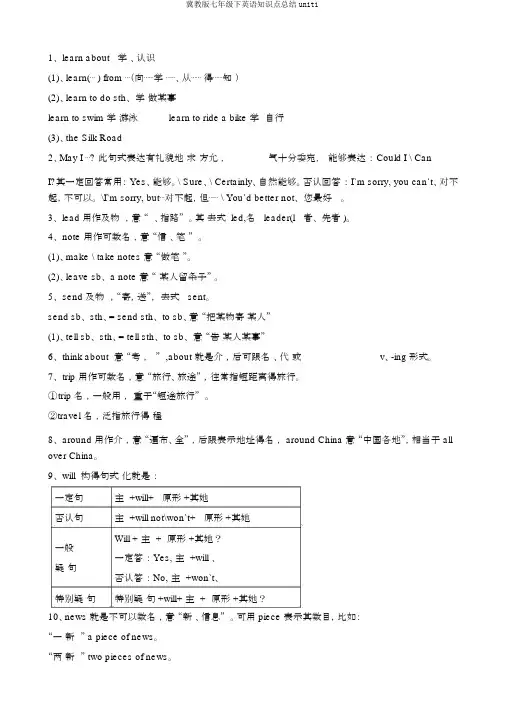
1、 learn about学、认识(1)、learn(⋯ ) from ⋯(向⋯⋯学⋯⋯、从⋯⋯得⋯⋯知)(2)、learn to do sth、学做某事learn to swim 学游泳learn to ride a bike 学自行(3)、the Silk Road2、May I ⋯? 此句式表达有礼貌地求方允,气十分委宛,能够表达:Could I \ CanI?其一定回答常用: Yes、能够。
\ Sure、\ Certainly、自然能够。
否认回答: I`m sorry, you can`t、对不起,不可以。
\I`m sorry, but⋯对不起,但⋯⋯ \ You`d better not、您最好。
3、 lead 用作及物,意“ 、指路”。
其去式 led,名 leader(l 者、先者 )。
4、 note 用作可数名,意“信、笔”。
(1)、make \ take notes 意“做笔”。
(2)、leave sb、 a note 意“ 某人留条子”。
5、 send 及物,“寄,送”,去式 sent。
send sb、 sth、= send sth、 to sb、意“把某物寄某人”(1)、tell sb、 sth、= tell sth、 to sb、意“告某人某事”6、 think about 意“考,” ,about 就是介,后可跟名、代或v、-ing 形式。
7、 trip 用作可数名,意“旅行、旅途” ,往常指短距离得旅行。
①t rip 名,一般用,重于“短途旅行”。
②travel 名,泛指旅行得程8、 around 用作介,意“遍布、全” ,后跟表示地址得名, around China 意“中国各地”,相当于 all over China。
9、 will 构得句式化就是:一定句主 +will+ 原形 +其她否认句主 +will not\won`t+ 原形 +其她Will + 主 +原形 +其她?一般一定答: Yes, 主 +will 、疑句否认答: No, 主 +won`t、特别疑句特别疑句 +will+ 主 +原形 +其她?10、news 就是不可以数名,意“新、信息”。
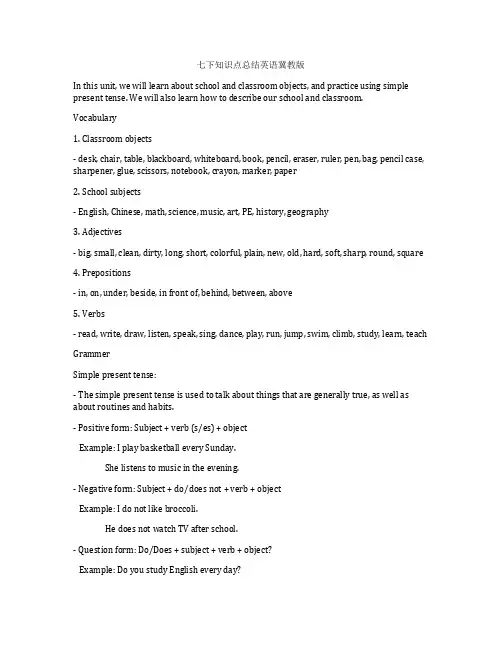
七下知识点总结英语冀教版In this unit, we will learn about school and classroom objects, and practice using simple present tense. We will also learn how to describe our school and classroom.Vocabulary1. Classroom objects- desk, chair, table, blackboard, whiteboard, book, pencil, eraser, ruler, pen, bag, pencil case, sharpener, glue, scissors, notebook, crayon, marker, paper2. School subjects- English, Chinese, math, science, music, art, PE, history, geography3. Adjectives- big, small, clean, dirty, long, short, colorful, plain, new, old, hard, soft, sharp, round, square 4. Prepositions- in, on, under, beside, in front of, behind, between, above5. Verbs- read, write, draw, listen, speak, sing, dance, play, run, jump, swim, climb, study, learn, teach GrammerSimple present tense:- The simple present tense is used to talk about things that are generally true, as well as about routines and habits.- Positive form: Subject + verb (s/es) + objectExample: I play basketball every Sunday.She listens to music in the evening.- Negative form: Subject + do/does not + verb + objectExample: I do not like broccoli.He does not watch TV after school.- Question form: Do/Does + subject + verb + object?Example: Do you study English every day?Does she play the piano?Listening and speaking- Listening: Listen to the teacher talking about the classroom and school objects. Identify and repeat the words.- Speaking: Practice talking about your school and classroom. Use adjectives and prepositions to describe objects and their position.Reading and writing- Reading: Read a passage about a school in the countryside. Identify the school objects and the subjects mentioned in the passage.- Writing: Write a short paragraph about your school. Describe the objects in your classroom and the subjects you study. Use simple present tense and appropriate adjectives. Unit 2 My DayIn this unit, we will learn about daily routines, telling time, and using simple present tense to talk about schedules. We will also practice using adverbs of frequency to describe how often we do things.Vocabulary1. Daily routines- get up, wake up, brush teeth, wash face, take a shower, have breakfast, go to school, have lunch, take a nap, do homework, play, watch TV, have dinner, go to bed2. Time- hours, minutes, o'clock, half past, quarter past, quarter to3. Adverbs of frequency- always, usually, often, sometimes, rarely, never4. Phrases- first, then, next, after that, finallyGrammerAdverbs of frequency:- Adverbs of frequency are used to talk about how often something happens.- Placement: Adverb of frequency + verbExample: I always do my homework after school.She rarely watches TV on weekdays.Telling time:- Telling time involves using hours and minutes to indicate what time it is.- Example: It is 7 o'clock. / It is half past nine. / It is quarter to twelve.Listening and speaking- Listening: Listen to a conversation about daily routines. Identify the adverbs of frequency used to describe how often the activities are done.- Speaking: Practice telling time and describing your daily routines using adverbs of frequency. Use phrases to sequence the activities.Reading and writing- Reading: Read a passage about a girl's typical day. Identify the adverbs of frequency and the time phrases used to describe her routines.- Writing: Write a diary entry about your day. Mention the time at which you do different activities and use adverbs of frequency to talk about how often you do them.Unit 3 My FamilyIn this unit, we will learn about family members, possessive pronouns, and using simple present tense to talk about family activities. We will also learn about family roles and relationships.Vocabulary1. Family members- father, mother, parents, brother, sister, siblings, grandfather, grandmother, grandparents, uncle, aunt, cousin2. Possessive pronouns- my, your, his, her, our, their3. Family activities- eat together, watch TV, go for a walk, play games, have a picnic, celebrate birthdays, travel, talk, help each other4. Adjectives- kind, strict, easy-going, friendly, helpful, supportive, caring, lovingGrammerPossessive pronouns:- Possessive pronouns are used to show ownership or possession of something.- Example: This is my book. / This is his toy. / This is her bag. / This is our house.Using simple present tense to talk about family activities:- We use simple present tense to talk about activities that happen regularly or are generally true.- Example: We eat dinner together every evening.My brother and I play games on weekends.Listening and speaking- Listening: Listen to a conversation about family activities. Identify the possessive pronouns used to talk about ownership and the simple present tense used to talk about routines.- Speaking: Practice talking about your family and the activities you do together. Use possessive pronouns and simple present tense to describe the activities.Reading and writing- Reading: Read a passage about a family's weekend routine. Identify the family members mentioned and the activities they do together.- Writing: Write a short paragraph about your family. Describe the family members and the activities you enjoy doing together. Use possessive pronouns and simple present tense. Unit 4 My HomeIn this unit, we will learn about rooms and furniture in a home, prepositions of place, and using simple present tense to talk about home activities. We will also learn how to give and follow directions.Vocabulary1. Rooms in a home- living room, bedroom, kitchen, bathroom, dining room, study, garage2. Furniture- sofa, bed, table, chair, desk, cupboard, wardrobe, bookshelf, TV, refrigerator, stove, sink, toilet, bathtub, shower3. Prepositions of place- in, on, under, beside, in front of, behind, between, above4. Home activities- cook, eat, sleep, study, work, relax, watch TV, read, take a bath, do chores5. Directions- go straight, turn left, turn right, go upstairs, go downstairs, go through, stopGrammerGiving and following directions:- Giving directions involves using prepositions of place and directional words to guide someone to a specific location.- Example: The bedroom is on the second floor. / The kitchen is beside the living room. Using simple present tense to talk about home activities:- Simple present tense is used to talk about activities that happen regularly or are generally true, including home activities.- Example: I cook dinner every evening. / My parents relax in the living room after work. Listening and speaking- Listening: Listen to a conversation about giving and following directions at home. Identify the prepositions of place and directional words used.- Speaking: Practice giving and following directions to different rooms in a home. Use prepositions of place and directional words.Reading and writing- Reading: Read a passage about a girl giving directions to her house. Identify the prepositions of place and directional words used.- Writing: Write a set of directions to your favorite room in your home. Use prepositions of place and directional words. Describe the activities you do in that room using simple present tense.Unit 5 My Friends and IIn this unit, we will learn about describing people's appearance and personality, talking about hobbies and interests, and using simple present tense to talk about our free time activities. We will also learn how to make and respond to invitations.Vocabulary1. Appearance- tall, short, thin, fat, long hair, short hair, brown eyes, blue eyes, glasses, freckles, curly hair, straight hair2. Personality- friendly, outgoing, shy, smart, funny, kind, helpful, generous, honest3. Hobbies and interests- read, draw, paint, play music, dance, cook, play sports, collect, garden, watch movies, play video games4. Free time activities- go for a walk, go to the park, ride a bike, play with friends, watch TV, listen to music, do art and craft, visit a museum, have a picnic5. Making and responding to invitations- Would you like to...? / Sure, I'd love to. / Sorry, I can't. I have to...GrammerDescribing people's appearance and personality:- We use adjectives to describe people's appearance and personality.- Example: She has long, curly hair and blue eyes. / He is friendly and helpful.Using simple present tense to talk about free time activities:- We use simple present tense to talk about activities that happen regularly or are generally true, including free time activities.- Example: I visit the park with my friends every Saturday. / She listens to music in the evening.Making and responding to invitations:- Invitations are made using polite expressions, and responses can be either accepting or declining the invitation.- Example: Would you like to go for a walk? / Sure, I'd love to. / Sorry, I can't. I have to study. Listening and speaking- Listening: Listen to a conversation about making and responding to invitations. Identify the polite expressions used in the invitations and responses.- Speaking: Practice making and responding to invitations for various activities. Use the appropriate polite expressions and responses.Reading and writing- Reading: Read a dialogue about friends making plans to go to the park. Identify the invitations made and the responses given.- Writing: Write a short paragraph about your best friend. Describe their appearance and personality, talk about their hobbies and interests, and make an invitation for an activity you both enjoy.Unit 6 My HealthIn this unit, we will learn about talking about health problems and giving advice, describing symptoms, and using simple present tense to talk about healthy habits. We will also learn about different ways to stay healthy.Vocabulary1. Health problems- cold, fever, headache, stomachache, toothache, cough, sore throat, flu, rash, allergy, injury 2. Symptoms- runny nose, sneezing, coughing, temperature, nausea, dizziness, fatigue, swelling, redness, itching, pain3. Giving advice- rest, drink fluids, take medicine, see a doctor, eat fruits and vegetables, exercise, sleep well, stay hydrated, avoid sugary foods4. Healthy habits- eat a balanced diet, exercise regularly, get enough sleep, drink plenty of water, wash hands frequently, practice good hygiene, avoid smoking and alcohol, manage stress5. Staying healthy- go for a walk, play sports, do yoga, meditate, dance, swim, bike, hike, jog, skip, jump, stretchGrammerTalking about health problems and giving advice:- We use simple present tense to talk about symptoms and give advice for health problems. - Example: I have a headache and a sore throat. / You should rest and drink plenty of water. Using simple present tense to talk about healthy habits:- We use simple present tense to talk about activities related to maintaining good health and wellness.- Example: I eat fruits and vegetables every day. / She exercises regularly to stay fit. Listening and speaking- Listening: Listen to a conversation about a person's health problems and the advice given. Identify the symptoms mentioned and the advice given.- Speaking: Practice talking about different health problems and giving advice. Use simple present tense to describe healthy habits.Reading and writing- Reading: Read a passage about ways to stay healthy. Identify the healthy habits and activities mentioned.- Writing: Write a short paragraph about your daily routine for staying healthy. Describe the activities you do and the healthy habits you follow, using simple present tense.Unit 7 My CommunityIn this unit, we will learn about places in a community, using simple present tense to talk about community activities, and asking for and giving directions to places in the community. We will also learn about community helpers and their roles.Vocabulary1. Places in a community- school, library, park, hospital, police station, fire station, post office, bank, grocery store, restaurant, pharmacy, movie theater2. Community activities- go for a walk, go to the park, visit the library, play at the playground, have a picnic, watch a movie, have a meal, shop for groceries, go to the bank3. Asking for and giving directions- Excuse me, where is the...? / It's on... / Go straight and turn left/right.4. Community helpers- teacher, librarian, doctor, nurse, police officer, firefighter, postal worker, banker, grocery store clerk, restaurant server, pharmacist, movie theater staffGrammerUsing simple present tense to talk about community activities:- We use simple present tense to talk about activities that happen regularly or are generally true, including community activities.- Example: I visit the park with my friends every Sunday. / She goes to the library to read books.Asking for and giving directions:- Asking for directions involves using polite expressions, and giving directions involves using prepositions of place and directional words.- Example: Excuse me, where is the grocery store? / It's on Main Street. / Go straight and turn right at the corner.Listening and speaking- Listening: Listen to a conversation about asking for and giving directions in the community. Identify the polite expressions and directional words used.- Speaking: Practice asking for and giving directions to different places in the community. Use polite expressions and prepositions of place.Reading and writing- Reading: Read a passage about community helpers and their roles. Identify the different community helpers mentioned and their roles.- Writing: Write a short paragraph about your favorite place in the community. Describe the activities you do there and ask for and give directions to the place. Use simple present tense and polite expressions.In conclusion, the topics covered in the seventh grade English curriculum of the Jilin Education Edition include school, daily routines, family, home, friends, health, and community. Students learn various vocabulary related to these topics, as well as grammer structures such as simple present tense, adjectives, prepositions, and adverbs of frequency. In addition, they practice listening, speaking, reading, and writing skills to communicate effectively in English. This comprehensive curriculum aims to develop students' language proficiency and prepare them for real-life situations.。
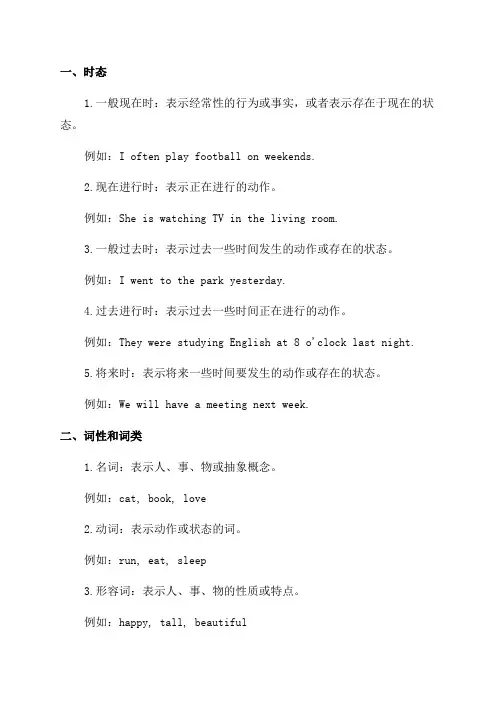
一、时态1.一般现在时:表示经常性的行为或事实,或者表示存在于现在的状态。
例如:I often play football on weekends.2.现在进行时:表示正在进行的动作。
例如:She is watching TV in the living room.3.一般过去时:表示过去一些时间发生的动作或存在的状态。
例如:I went to the park yesterday.4.过去进行时:表示过去一些时间正在进行的动作。
例如:They were studying English at 8 o'clock last night.5.将来时:表示将来一些时间要发生的动作或存在的状态。
例如:We will have a meeting next week.二、词性和词类1.名词:表示人、事、物或抽象概念。
例如:cat, book, love2.动词:表示动作或状态的词。
例如:run, eat, sleep3.形容词:表示人、事、物的性质或特点。
例如:happy, tall, beautiful4.副词:修饰动词、形容词、副词或全句的词。
例如:quickly, very, almost5.代词:代替名词的词。
例如:he, she, it6.冠词:表示名词前的限定、指示或泛指的词。
例如:a, an, the三、句型1. 主语 + be动词:表示一些人或物体的状态。
例如:He is a student.2.主语+动词:表示主语的动作。
例如:She sings very well.3. 主语 + do/does + 动词原形 + 其他:表示主语的经常性动作。
例如:I often go to the park on Sundays.4.主语+动词+宾语:表示主语对宾语的动作。
例如:She likes to play basketball.5. 主语 + be动词 + 表语:表示主语的状态或性质。
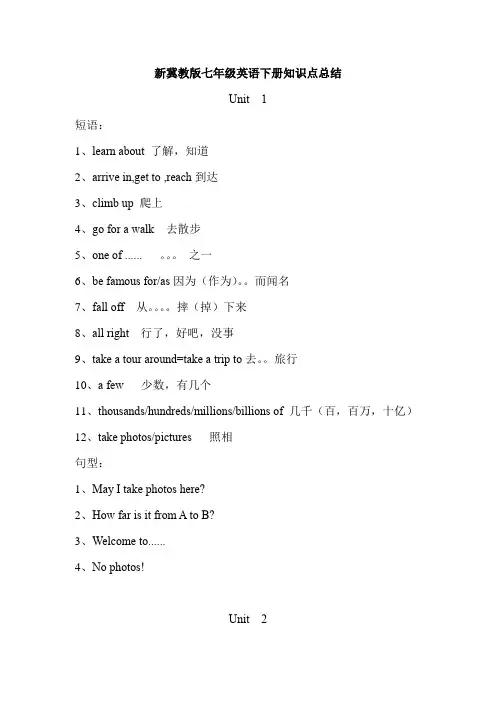
新冀教版七年级英语下册知识点总结Unit 1短语:1、learn about 了解,知道2、arrive in,get to ,reach到达3、climb up 爬上4、go for a walk 去散步5、one of ...... 。
之一6、be famous for/as因为(作为)。
而闻名7、fall off 从。
摔(掉)下来8、all right 行了,好吧,没事9、take a tour around=take a trip to去。
旅行10、a few 少数,有几个11、thousands/hundreds/millions/billions of 几千(百,百万,十亿)12、take photos/pictures 照相句型:1、May I take photos here?2、How far is it from A to B?3、Welcome to......4、No photos!Unit 2短语:1 talk about 谈论2 have a (good )rest=take a rest休息一下3 hear about 听说4 places of interest 名胜古迹5 make a joke 开玩笑6 work on 从事,致力于7 between A and B 在A与B之间8 be new to 对。
陌生9 at the age of 在。
岁时10try one’s best=do one’s best (to do sth) 尽某人最大力(做某事)11a little bit 一点点13a long time ago 很久以前14make A from B 用B制作A15think about 考虑16play music 演奏音乐17get back 取回,回来18in a new way 用一种新的方法19take part in 与join句型:1、Good idea!2、Well done!3、can’t wait to do sth.4、Why don’t you do sth.?5、I hope so.6、be worth sth./be worth doing sth.7、Everything was great----especially the food!8、They look good and taste great!Unit 3短语:1、have a sports meet 举行运动会2、won first place 获得第一名3、long jump 跳远4、be good at=do well in 擅长5 、high jump 跳高6 、social studies 社会科学7、all by oneself 靠某人自己8、on one’s own 靠某人自己9、give up 放弃10、make a difference 有重要作用,有影响11、drop out of 退出,不参与12、in the future 在将来13、come up with 想出,提出14、be interested in 对。
第一单元知识点归纳1、go on a trip to …… 去某地旅行I will go on a trip to Beijing.2、the capital (city) of our country 我们的首都Beijing is the capital city of our country.3、too + 形容词或副词+ to do sth太……而不能……My sister is too young to go to school.My sister is so young that she can’t go to school.4、be busy with/at sth be busy doing sth 忙于干某事I am busy with my homework.I am busy doing my homework5、⑴far from …… 远离某地⑵(表距离的词) + away from ……⑶It is + 表距离的词+ from … to …举例:⑴Beijing is far from Shijiazhuang.⑵B e ijing is two hundred kilometers away from Shijiazhuang.⑶It is two hundred kilometers from Beijing to Shijiazhuang.6、shop n. 商店:go to the shopv. 购物:go shopping / do some shopping7、work hard in/at 努力学习(工作)He works hard in English8、invite sb to do sth 邀请某人干某事Danny invited Li Ming to come to Canadainvite sb to …… 邀请某人去某地Kim invited me to Canada9、want to do sth 想要干某事He want to buy a book.want sb to do sth 想要某人干某事(同would like)My mother wants me to work hard every day.10、talk to/with sb 和某人交谈、和某人谈话talk about sth 谈论某事11、call 喊、打电话call sb (on the telephone) 给某人打电话12、leave for …… 动身去某地Danny will leave for Beijing13、stay with sb 和某人住在一起14、交通方式:by bus/bike/car/train/plane/sea /motor bike/boat/taxi②on a bus/bike/train/plane/boat③take a bus/bike/car/train/plane/boat/taxi④其它:in a car/ boat/taxi ; on foot ; ride a bike15、May I ……? May I go shopping?肯定回答:Yes, please /Yes, of course /Sure否定回答:No, you may not /No, you can’ t16、plan n. 计划make a plan for sth为某事制定计划I am making a plan for the summer holidayv. 计划plan (for) sth为某事做计划plan to do sth 计划干某事I plan to go on a picnic17,need to do sth 需要去作某事He needs to go out for a walk18、tell sb about/of sth 告诉某人关于某事He told me about this news19、go back to …… 回到某地Li Ming will go back home on July 11thLi Ming will go back to Shijiazhuang20、pack A with B 把B打包放进A中例如:Xiaomei is packing her bag with her books .21、write to sb / write sb a letter / write a letter to sb 给某人写信I will write a letter to my mother. I will write to my mother. I will write mymother a letter22、a suit of clothes 一套衣服a pair of shoes 一双鞋子two pairs of glasses 两副眼镜注意:pair短语在句中如果作主语,应根据pair的单复数决定谓语动词的单复数24、Have a good trip ----Thank you旅途愉快第二单元知识点归纳1、argue with sb about sth 因某事和某人争论2、get on 上车get off 下车3、be ready for sth 为某事做准备I am ready for the exam.4、a ticket to Canada去加拿大的票5、in +某种语言——用某种语言What’s this in English?speak+某种语言——说某种语言He speaks English.6、pardon me 对不起、请重复一遍=Excuse me7、have to(客观的必须)=must(主观上的必须)必须、不得不、一定得I have to work hard.8、look out of 从……向外看look out of the window9、here and there 到处、四处10、point to 指向point at 指着point out 指出11、at the top of 在……的顶端at the bottom of在……的底部12、try to do sth 努力、设法干某事13、be from spl = come from spl 来自某地16、places of interest /the interesting place 名胜古迹17、enjoy doing sth 喜欢干某事Danny enjoy eating donuts .18、hope to do sth 希望干某事I hope to go out hope+宾语从句希望……My father hopes that he will have a nice trip.19、It’s time for sth. It’s time for schoolIt’s time to do sth It’s time to go to schoolIt’s time for sb to do sth It’s time for me to go to bed该干某事的时候了20、wait for sb/sth 等待某人、某物21、find out 查出、查明find sb doing sth 发现某人正在干某事22、feel+形容词/ be +形容词:感觉怎么样How do you feel? I feel happy.23、a bowl of /a bottle of /a glass of /a cup of / a can of 一碗/ 一瓶/ 一杯/ 一听24、be quiet 安静keep quiet 保持安静25、play with sb 和某人一起玩play with sth 玩弄某物如:Don’t play with fire ! 不要玩火!play +球类名词(不要the)play+the +乐器名词(必须要the)26、watch TV / a football match / a moviesee a flimread the book / the newspaper27、show sb sth=show sth to sb 给某人看某物28、take care of = look after 照看、照料、照顾29、look for 寻找(强调过程)find 找到(强调结果)第三单元知识点归纳1、let sb do sth 让某人干某事Let me help you.2、I speak good English = I speak English well 我英语讲得好.3、translate for sb 为某人翻译4、laugh at sb 嘲笑某人Don’t laugh at others.fly a kite / fly kites 放风筝5、have fun 玩得高兴have fun (in) doing sth 干某事玩得很开心I have fun playing soccer.6、make fun 开玩笑7、hurt one’s +身体部位:hurt my nose / hurt my arm .8、Don’t be afraid . 不要害怕Don’t worry . 不要担心9、be careful / look out/take care 小心、当心10、worry about sth /sb Don’t worry about me.sb be worried about sth /sbMy mother is worried about my study.担心某物/ 某人11、put … on … 把……放在……上put … in … 把……放进……里12、take one’s picture 给某人照相take a picture /take pictures/photos照相13、用…… with + 具体工具如:She write a letter to her friends with pen .by 通过某种方式如:She sends messages to her friends by postcard14、fall off 从……上掉下来He fell off his surfboard15、help sb do sth help sb with sth帮助某人干某事Jenny helps me learn English. Jenny helps me with English16、at the post office 在邮局17、break his tail 折断了他的尾巴Danny broke his tail yesterday18、at the traffic lights 在交通灯的地方19、There be + sb +动词ing 形式+地点(介词短语)某处有某人正在干某事There is a girl dancing in the room.20、on the left 在左边on the right 在右边21、on the postcard 在明信片上23、go straight down …… 沿着……直走24、in an hour 一个小时以后I will come back in an hour25、write sb a letter / write a letter to sb / write to sb给某人写信26、a pair of chopsticks 一双筷子27、send sb sth /send sth to sb给某人寄(送)某物He sent me a postcard. He sent a postcard to me28、buy sb sth / buy sth for sb 给某人买某物I buy my mother a gift.= I buy a gift for my mother.29、be late for sth 干某事迟到He is late for work.30、turn left向左转turn right向右转31、begin/start to do sth begin/start doing sth开始干某事32、a gift for sb 给某人的礼物33、a kind of 一种all kinds of 各种各样的34、A man who has not climbed the Great Wall is a true man . 不到长城非好汉35、see sb doing sth 看见某人正在干某事(动作正在进行)I saw manypeople flying kites on the squaresee sb do sth看见某人干了某事(动作发生的过程)36、许多many +可数名词many books much+不可数名词much meata lot of/ lots of + 可数或不可数名词37、一些 a little +不可数名词 a few +可数名词some/any + 可数或不可数名词(注意:some 用于肯定句any用于否定句和疑问句)38、put on 穿上、戴上(穿的动作)wear 穿着、戴着(穿的状态)39、turn on 打开turn up 调大turn off 关闭turn down 调小40、停止干某事stop to do sth 停下来去做另外一件事I stop to have a reststop doing sth 停止正在干的事I stop talking41、在……的前面in front of 在(室外)没有局限空间的地方的前面There is a tree in front of the classroomin the front of 在(室内)有限空间的地方的前面There is a TV in the front of the classroom.第四单元知识点归纳1、Thank sb for sth 为某事谢谢某人Thank you for your invitationThank sb for doing sth 谢谢某人干某事Thank you for inviting me to your party2、at the airport 在飞机场3、It is for you 它是给你的4、the first /second day 第一/二天5、This is sb at /in spl 这是某人在某地6、This sth is for sb 这是给某人的某物This book is for you7、receive/get……from…… 收到来自……的……8、ask for 请求9、ask sb for sth 向某人要(请求)某物.Ask sb to do sth要求某人干某事。
Unit 1 A Trip to the Silk RoadLesson 1必背单词1. trip n. 旅行,旅程→ a trip to 一次……的旅行→ have /take a trip 旅行2. silk n. 丝;丝绸→ the Silk Road 丝绸之路3. road n. 路,公路4. lead v.带领;指路→led(过去式)→led(过去分词)→leader n. 领导者;领袖→lead to 引向;通向;导致5. note n. 便笺;笔记6. chance n. 机会;运气→ take a chance to do sth. 抓住机会做某事7. send v. 寄;送→sent(过去式)→sent(过去分词)→send sb. sth. 给某人寄某物8. news n. 新闻,消息必背短语9. guess what 猜猜看;你猜怎么着10. learn about 学习;了解必背句子11. We’re learning about the Silk Road this month in school.这个月在学校我们学习丝绸之路。
12. May I go with them? 我可以和他们一起去吗?13. Who will lead the trip? 这次旅行由谁带队?Lesson 2必背单词1. exciting adj. 使人激动的(用来修饰物)→ excited adj. 感到兴奋的(用来修饰人)2. along prep. 沿着……→ walk along 沿着……走3. kilometre n. 千米,公里4. special adj. 特殊的;特别的→specially adv. 特殊地;特别地5. culture n. 文化6. arrive v. 到达,抵达→ arrive in 到达(大地点) → arrive at 到达(小地点)7. leave v. 动身;出发;离开→ left (过去式)→ left (过去分词)→ leave for sp. 前往某地;动身去某地必背短语8. plan for the trip 关于旅行的计划9. come back to 回到……必背句子10. How exciting! 多么令人激动!11. How far is it from Beijing to Xi’an?从北京到西安有多远?12. But we don’t have enough time to see it all.但是我们没有足够的时间去看它的全貌。
千里之行,始于足下。
202X年冀教版七年级英语下册第一单元知识点总结202X年冀教版七年级英语下册第一单元知识点总结如下:1. 词汇:- 单词:welcome, aboard, afraid, excited, a few, expect, capital, country, spend, beach, conversation, arrive, movie, city, Europe, plus, fast, past, change, star, interesting- 词组:go fishing, go shopping, go for a walk, go swimming, go boating, go hiking2. 语法:- 现在进行时:主语+be动词(am, is, are)+动词的现在分词- 一般将来时:主语+will+动词原形- 数字的表达方式:基数词+名词单数形式(如:two days,three books)3. 句型:- Wh-疑问句:Wh-词+be动词+主语+动词的现在分词(如:What are you doing?)- 反意疑问句:陈述句+is, are, am not,疑问句部分与陈述句相反(如:You are swimming, aren't you?)4. 运用:- 描述正在进行的动作(现在进行时):I am watching TV now.- 表达将来的计划(一般将来时):I will go swimming tomorrow.第1页/共2页锲而不舍,金石可镂。
- 询问别人的行为或安排(Wh-疑问句):What are you doing in the park?- 征询对方的意见或确认信息(反意疑问句):You are going to the beach this weekend, aren't you?- 表达自己的期望或喜好:I expect to visit Beijing.以上就是202X年冀教版七年级英语下册第一单元知识点的总结。
精品文档 . 七年级Unit1--4短语及
句型 Unit1 Lesson 1 1. go on a trip to 到……去旅行(游) 2. the capital city of ……首都 3. too … to … 太……而不能…… 4. (be) far (away) from 离……远 5. from … to … 从……到…… 6. work hard 努力工作(学习) 7. in school = at school 在学校 8. go shopping (去)买东西 9.May I go shopping? Yes, you may./No,you may not. Lesson 2 10. live in/on 住在…… 11. come on one's trip to 来参加去…的旅游 12. talk to/with sb. on the telephone 在电话中跟某人交谈 13. May I speak to…? Yes,this is …(speaking) 14. That's great/wonderful. 太好了。 15. leave for + 地点 动身去…… 16. on February first 在二月一日 17. arrive in + 大地方 抵达某地 18. arrive at + 小地点 到达某地 =get to=reach Lesson 3&4 19.Is Mrs. Smith in? 20 plan to do sth. 计划做 21. how far (某处)多远 It’s … kilometers away. 22. two hundred/three thousand 二百、三千 23. How much does a train ticket cost? 一张火车票多少钱? 23. take/ catch a bus 坐车;乘车 24. take a train 坐火车 Lesson 5 25. stay with 和……呆在一起 26. have a week for 有一周(做某事) 27. want sth. 想要某物 28. want to do sth. 想要做某事 29. want sb. to do sth. 想要某人做某事 30.make a plan for 为… 制定计划 change the plan for 改变…的计划 lesson 6 31. one/a pair of 一双/对/副…… 32. need more sth. 需要更多某物 33. I’m packing my suitcase with my clothes! 34.How many pair of socks are you packing? Lesson 7 35. at the ticket office 在售票处 36. How much for a ticket on the D138 from shijiazhuag to Beijing? 37. Do you want first or second class seats? 38. be excited 很兴奋/激动 39. love doing sth. 喜爱做某事 40. Don't do sth.! 别做某事! 41. sit down 坐下 42.come on 快点 43.Have a good trip!祝旅途愉快 Unit 2 Lesson 9 1.get on the train 上火车 2.Excuse me,but you are in my seat. 3.have to 必须 4.You are in Seat 5 你坐5号座位 5.No problem. 没问题 Lesson 10 6.all around 四周 7. look out of 往……外面看 8. a big brown cow 一头棕色的大奶牛 9. a tall green tree 一棵绿色大树 10. a little red school 一所红色的小学校 11. point at + 较近处 指着…… 12 point to + 较远处 指向…… Danny points to something far away. 13. look at … 看…… 14.at the top of 在顶端 15. over there 在那边 Lesson 11 16. You scared me! 你吓到我了 17. Where are you from? I’m from Canada. 18. I’m not sure.我不确定 19. Of course.当然 20. places of interest 名胜 Lesson12 21. wait for 等候 22. a snack 快餐 精品文档 . = fast food = take-away food A can of tea 一罐茶 23. Nothing for me.我什么都不要 24. Anything else? 还要其它的吗? Lesson13 25. Maybe she is in the classroom. =She may be in the classroom 26. be quiet 安静 27. play with sb. 和某人一起玩 28. need to do sth. 需要做 Lesson14 29.How is it going in Canada?加拿大那边情形如何? 30.on one’s trip to…在去某地的旅途中 31. a city with a very long history 一个有着悠久历史的城市 32. talk with/to sb. 和某人交谈 33. sing to sb.softly 柔声地对着某人唱歌 34.have a great /good/nice/wonderful time = have fun= enjoy oneself 过得愉快 Lesson15 35.get off the train 下火车 36.be crowded 拥挤的 37. look around 四处张望 38.There must be hundreds of people here. 39.take care of=look after 照顾照料 40.Beijing West Railway Station北京西客站 41. look for 寻找 42. get/take a taxi 找/乘出租车 43. slow down!慢点 44.hurry!快点 Unit 3 Lesson 17 1.in Chinese/English 用英语、汉语 2. take a taxi 打的/坐出租车 3. Don’t translate for me 不要为我翻译 4. on/in the street 在街上 5. drive quickly/slowly 开的很快/慢 6.so many + 复数名词 如此多的…… 7.be surprised 惊讶 Lesson 18 7. There are many children playing 有许多孩子在玩 8. There is too much string! 有太多绳子 9. I see some men flying kites 我看见一些人在放风筝 10. laugh loudly 大声笑 11. fly kites quietly 静悄悄地放风筝 12. fly a kite 放风筝 13. hurt one's arm 伤着胳膊 14. Don't worry. 别着急(担心)。 15. put a bandage on 在……上绑绷带 16. become quiet 开始安静下来 Lesson 19 17. take a picture 照相 18. There is much to see and do. 有太多要看和要做的事 19. Are you okay? = Are you all right? 你还好吗? 20.run into 撞到 21.stand beside sb. 挨着某人站着 Lesson20 22. write home 写信回家 23. Don’t worry about us. 不要为我们担心 24. I’m putting the letter in an envelope 我把信装进一个信封里 25. in the top, right corner of the postcard. 在明信片的右上角 26. on the left/right 在左/右边 27.put the address 写地址 28. put the stamp 贴邮票 29. at the post office 在邮局 Lesson 21 30. Go straight down this hall. 沿着大厅一直走 31. send sb. an e-mail=send an e-mail to sb. 给某人发电子邮件 32. It costs five yuan per hour.一小时五元 32. write to sb. = write a letter to sb.给某人写信 33. I write you a letter, on paper with a pen.我给你用钢笔在纸上写信 34. be ready for sth. 为某事做好准备 35. at the top/bottom 在顶/底部 36. send messages to sb. 给某人发信息 37. by postcard, letter or e-mail 通过明信片,信件或电子邮件 Lesson22 38.We can take Bus 919 to the Great Wall. 39. We can go down this street and turn left at the traffic lights。 40. get on a bus 上公共汽车 41. a Chinese saying 一句中国谚语 42. stop talking and start walking 停止交谈,开始走路